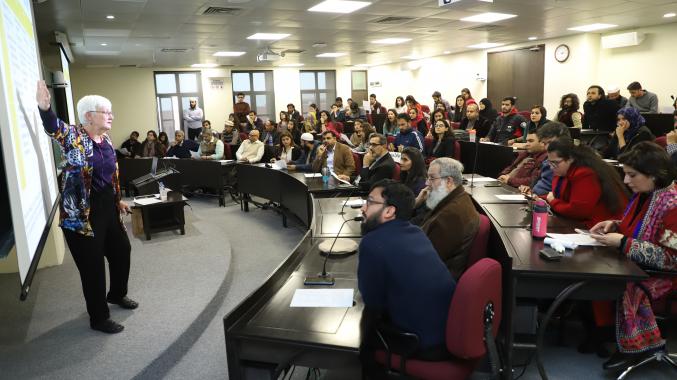
Dr. Denise Chalmers spoke about ‘Evaluating the Effectiveness and Impact of Educational Programmes and Projects’ at the EduSpeak session held at the Syed Ahsan Ali and Syed Maratib Ali School of Education (SOE) on February 4, 2019.
Dr. Chalmers is Professor Emeritus in the field of higher education teaching and learning at the University of Western Australia. She has over 25 years of experience of leadership in higher education, leading two university Centres of Teaching and Learning as Director and was also a Foundation Director of the Carrick Institute (later ALTC) responsible for Awards, Fellowships and International Linkages. She has served as President and then as Vice President of the Council of Australian Directors of Academic Development (CADAD) and is President-Elect for the Higher Education Research and Development Society of Australasia (HERDSA). She has initiated and led several institutional, national and international initiatives and projects related to teaching quality indicators and performance indicators to guide decision-making and resource allocation.
Dr. Arshad Ahmad, Vice Chancellor LUMS, Dr. Tahir Andrabi, Dean SOE, Dr. Shahid Masud, Dean Syed Babar Ali School of Science and Engineering, LUMS faculty and students, attended the session. Hina Sohail, student of MPhil Education Leadership and Management at SOE, moderated the event.
The session aimed to address the issue of ineffective evaluation of educational programmes. Dr. Chalmers discussed how often thoughtful consideration is not given to appropriate evidence of the effectiveness of the programme or to the recipients that will be impacted by the programme when it is being designed. “While it is possible to collect robust evidence after a programme has commenced, a more effective way is to devise an evaluation plan at the outset so that evidence can be collected at strategic points throughout a programme to inform all stakeholders - students, teachers and administrators – on the progress of the programme and its achievement of intended and unintended outcomes,” she said.
She stressed on the importance of specifying the recipients of the educational programme. Knowing whether the programme addresses the students, teachers, programme of study, institutions or system, helps in the evaluation of the project. She stressed on the importance of understanding the input, process, output and outcome of the project. To drive the point home, she shared her own projects with the audience, providing a clear distinction among input, process, output and outcome. She also talked about keeping the project feasible and realistic, the importance of teamwork and team building, and communicating with other stake holders. At the end, she emphasised on reviewing the project regularly, adapting to changing circumstances and modifying accordingly.
The session was interactive with an activity in-between where the audience had to discuss among themselves what they thought education programmes should demonstrate and what indicators to use for gauging impact. The Question and Answer session comprised rich exchanges between the Vice Chancellor, Deans, faculty and students. Dr. Ahmad addressed the importance of professional development programmes; other important topics were also discussed including problems of identifying issues at the organisational level, teacher resistance to reforms, and the need for allowing development and improvement through every level. The session witnessed an overwhelming turnout by the LUMS community, curious to learn about educational programmes and the ways to make them more effective.








